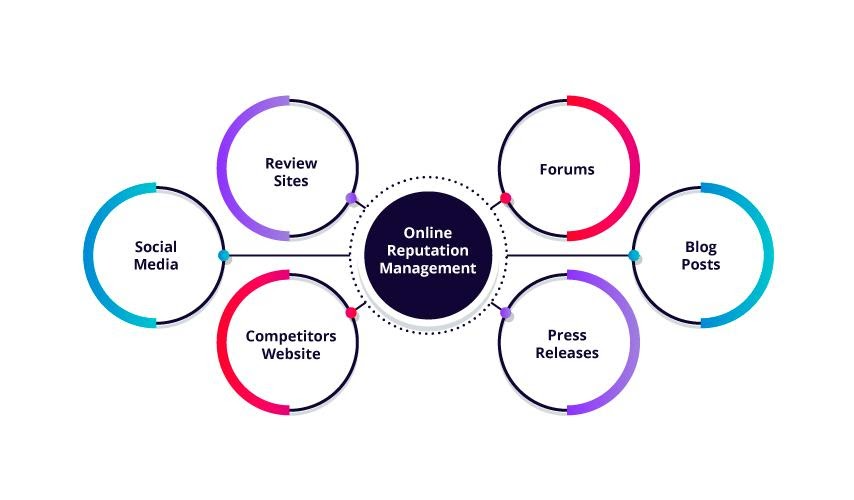A Guide about Online Reputation Management and Review Management

Do you know everything that’s being said online by people about your brand? If you don’t, it’s time to dive into it!
This blog will walk through how you can set up streamlined online reputation management and cover the what, why, and more importantly, the how. We will also be going through how you can build a positive reputation and leverage reviews to build trust amongst your customers.
Online reputation management (ORM) basically involves interacting with your community of customers who use search engines to find your information, rate, and review your business. They may also leave comments on your social media pages or interact with your company online.
A solid online reputation management strategy ensures that the information online about your business listings is accurate, making it easy for customers to find you. It enables you to capitalize on the potential of online conversations about your company to strengthen your brand promise.
People learned about companies and products before through word of mouth and by asking friends, family members, and coworkers before the internet. TV advertisements, print ads, and celebrity endorsements were the go-to strategy for attracting new customers.
Companies then created websites to have direct communication with their customers. However, this flows only in one direction. This made it easy for businesses to mediate complaints and negative sentiments.
But times have changed – customers are the ones in control now. All businesses can do now is to react and respond in the right way.
What is ORM?
Reputation management involves the practice of determining what customers are saying, feeling, and thinking about your company. Then taking the initiative to ensure that the overall customer opinion aligns with your objectives.
ORM typically works by replying to negative customer comments across platforms and reacting to complaints on social media and other traditional platforms that portray your business in a negative light.

Why is Online Reputation Management Important?
Consumers frequently read product, store, or service reviews before making a purchase. And sometimes people don’t always buy something because of a negative review or an absence of reviews.
87% of customers read online reviews for local businesses in 2020 – up from 81% in 2019.
Consider yourself: before booking a trip or vacation, you carefully read reviews when looking for vacation rentals or hotels, you look for company responses to negative reviews and complaints about products or services, and so on. This highlights the importance of online reputation for both customers and businesses.
Good online reputation management can help you:
1. Rank Better On Search Engines
Online reviews can have a significant impact on Search engine optimization. Customers place a lot of importance on companies’ online reviews when making purchase decisions and search engine algorithms know this very well. As a result, companies that exert the most effort to manage their online reputation are rewarded with higher SEO visibility.
2. Increase Customer Confidence
It’s not just about pleasing the algorithm when it comes to online reviews. It’s also about how people recognize your brand. With customers trusting online reviews, gaining their trust is critical. Everyone understands that a company’s reputation is critical for its survival. Once the customer’s trust is earned, the existing customer will tell others about the company.
A lot of importance is placed on online reviews when deciding whether or not to trust a brand. A good reputation management system can quickly assist a business in gaining trust. As a result, positive reviews can increase potential customers’ confidence in the company. A good reputation indicates that the company is more credible than the competition.
3. Become More Transparent
Companies that are transparent share their highs and lows with their customers and engage in conversations with them. The only way to demonstrate that you have nothing to hide is to respond to criticism publicly and maintain open communication.
Over 90% of consumers feel brand transparency is crucial in their purchasing decisions.
4. Understand Your Customers Better
Tracking your online reputation allows you to see your brand through the eyes of your customers. You can learn what customers think of the company – both positives and negatives and whether it is with the product or with customer service. This type of research will help you come up with new ideas and learn to improve your weak points.
For example, StoryLab, an Instagram story art app leverages Google Play Store reviews to inform customers about upcoming updates.

5. Boost Customer Engagement
The more channels your company monitors and participates in, the better your chances of increasing customer engagement rates. This is achievable by adopting both a proactive and reactive approach to client conversations. You can keep customers invested in your brand by being active online, providing special offers and responding to their questions and comments as soon as possible. As a result, they will be less likely to churn and switch to your competitors.
How to Manage Your Online Reputation?
It is critical to understand that online reputation management entails developing a strategy for managing online chatter, sentiment, and feedback and putting that strategy into action through engagement.
The past two years have seen a tremendous increase in customers reviewing products and businesses online. As a business, it’s important to keep track of developments in ORM, learn what happened in the month of October: Here.
1. Keep Track of Your Social Footprint
Facebook, Twitter, and Google are three of the most popular platforms, but they are far from being the only channels customers review your business on. Conduct regular searches on each platform for your brand name or product to see what people are saying about you. You can gain valuable insights into consumer sentiment toward your brand in addition to being able to respond to problems (see below). Remember to check all relevant platforms, not just the ones where you are active.
2. Respond to People As Soon As Possible
People expect you to converse with them if you have a social media presence. When your customers contact you via social media, they expect you to respond immediately. Even if you can’t solve the issue right away, at least acknowledge it and give them updates. Engage with people who leave comments on your posts to build a long-term connection with customers.
3. Ask Customers to Leave Reviews and Ratings
Online reviews are effective tools, particularly for attracting customers early in the purchasing cycle. If you are making your customers happy, ask them to post reviews so that they can express their opinions and help you build your review collection. Create an email marketing campaign to encourage customers to leave reviews if you have a large customer base. When asked, more people will leave a review. If you’re having trouble getting reviews, consider incentivizing the process with a giveaway or competition as part of your campaign.
Online reviews are important to customers looking for products and services. Google and Yelp reviews are the most visible because they appear first in search results, making your brand appear more trustworthy.
4. Use a Reputation Management Software
An Omnichannel Reputation management software can help you centralize all the channels you are present on. Your team can conveniently respond to reviews across channels from a single centralized inbox.
An ORM software also removes all the grunt work, you can automate workflows, tagging, escalations, alerts and much more. Most ORM software also offers automated responses to reviews, ensuring your response time is as fast as possible. You can also access comprehensive insights about your team’s performance and customers.
Conclusion
Incorporating online reputation management into your overall digital strategy is essential to ensure continued business growth and success. Identifying how to influence the purchasing decisions of today’s well-informed consumers — and enhancing their experiences necessitates the right combination of people, strategy, and technology for creating and maintaining a strong online reputation.
Thanks to Dewarticles for publishing our article.





